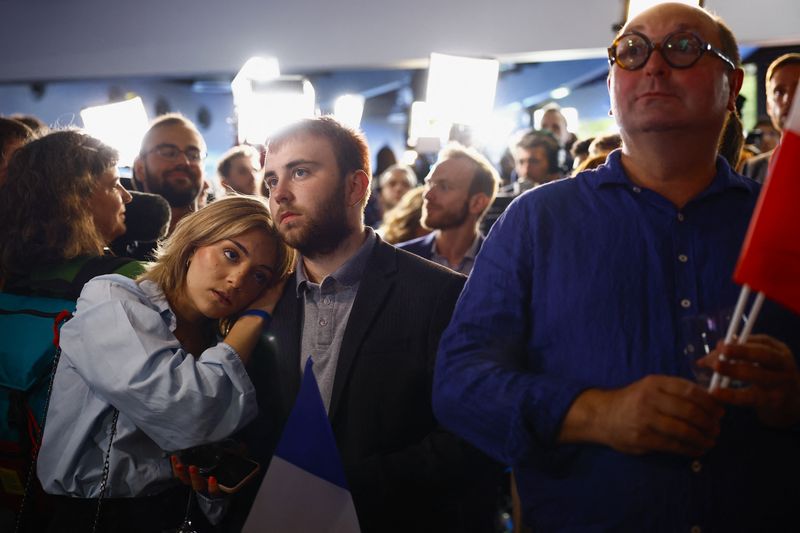[ad_1]
By Elizabeth Pineau
PARIS (Reuters) – The champagne was on ice at the far-right National Rally’s (RN) headquarters, but the celebratory mood swiftly turned to disbelief when the first projected results from Sunday’s parliamentary election appeared on TV screens.

For days, Marine Le Pen had confidently predicted that her party would triumph with an outright majority and her protege Jordan Bardella would be prime minister. Instead, the National Rally was on course to come third, behind a left-wing alliance and President Emmanuel Macron’s centrist bloc.
It was undone to a large extent by tactical dealmaking between centrist and leftist opponents, who pulled more than 200 candidates from three-way races to avoid splitting the anti-RN vote.
The projected result brought to a shuddering halt what had appeared to be the far right’s relentless rise in France, carefully engineered by Le Pen who had sough to clean up her party’s image and tap the grievances of voters angry over living costs, strained public services, and immigration.
To be sure, Le Pen and her party have suffered disappointment before, most recently her 2022 defeat to Macron in the presidential election, and have managed to bounce back more strongly than before.
But for now, the outcome was a bitter pill to swallow.
„The results are disappointing and they don’t represent what French people want,” said Jocelyn Cousin, 18, who had come to party HQ expecting a victory party.
The RN’s momentum had appeared unstoppable after it trounced the centrists in European elections in early June and came first, ahead of the hastily assembled leftist New Popular Front, in the first round of the parliamentary vote on June 30.
Le Pen and Bardella attributed their party’s setback on Sunday to the what Bardella called the „disgraceful alliance” the anti-RN forces, who he said had caricatured the party and disrespected its voters.
But IPSOS pollster Brice Teinturier pointed to the RN’s own shortcomings, including revelations before the run-off that several of its candidates had expressed xenophobic views, raising questions over whether the party had really ditched its more toxic past.
„What happened is also that RN candidates themselves showed in this campaign that they either were not ready or had in their ranks candidates that are antisemitic, xenophobic or homophobic,” Teinturier told France 2 television.
’TIDE IS RISING’
Florent de Kersauson, an RN candidate in Brittany in western France, acknowledged the fallout had been damaging. But he also said voters may have felt the party was arrogant in predicting an absolute majority.
„I thought it was strange that they said that,” said Kersauson, who lost his race against a pro-Macron candidate. „It seemed like something that was very hard to achieve.”
Bardella and Le Pen strove to put a brave face on their result. The party had increased its share of seats in the National Assembly to a record high, they noted, vowing to keep fighting until they won power.
„The tide is rising, but it didn’t rise quite high enough this time,” said Le Pen, who is likely to mount her fourth presidential campaign in 2027. „Our victory has merely been delayed.”
That was also the feeling among many of the supporters gathered at party HQ in Paris.
„I see our victory coming. People are going to understand that the National Rally is not so horrible. I believe it will happen in 2027. I have a lot of hope and I’ll continue to fight,” said Elea da Cunha, 17.
Frederic-Pierre Vos, a close associate of Le Pen and former RN party lawyer elected in a constituency north of Paris, said the hung parliament thrown up by the election would mean an ungovernable France, providing fresh opportunities for RN in 2027.

Yet despite the party’s fighting talk, Sunday’s outcome was a clear setback.
Business newspaper Les Echos ran a front page showing a grim-faced Bardella with the headline „la claque” or „the slap”.
[ad_2]
Source link

